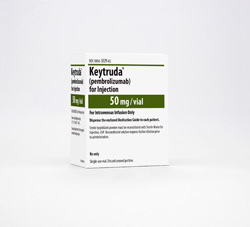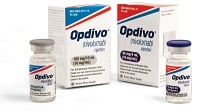
Merck's ($MRK) Keytruda--which has been leapfrogged by Bristol-Myers Squibb ($BMY) rival Opdivo since becoming the first PD-1 blocker to roll out in the U.S.--gained some regulatory ground in Europe on Friday, nabbing a melanoma recommendation that Opdivo snagged last month. But Opdivo continued to charge ahead, too, winning a nod in lung cancer to help preserve its lead.
The European Medicines Agency's (EMA) Committee for Medicinal Products for Human Use (CHMP) has endorsed Keytruda as a treatment for advanced melanoma, giving it a thumbs-up as a first-line treatment and in previously treated patients. Regulators based the recommendation on an uncontrolled study and on early results from two ongoing, controlled trials, one comparing Keytruda with standard chemo and the other pitting it against another BMS melanoma-fighter, Yervoy.
CHMP's go-ahead puts Keytruda back on even footing with Opdivo in the skin cancer arena. Despite Keytruda's first-to-market status in the U.S.--Merck got the FDA's blessing in September, while BMS had to wait until December--Bristol's therapy has been quicker to lock down the EMA committee's favor, which it did last month. Now, both companies are waiting for official marketing authorization from the EMA.

Meanwhile, though, Opdivo scored another CHMP nod Friday to push forward in squamous non-small cell lung cancer (NSCLC), a field in which it recently recorded a speedy FDA approval. European regulators smiled on the therapy after it improved overall survival by a median 3.2 months compared with chemo drug docetaxel in a Phase III study.
As for Keytruda, it's much further behind when it comes to lung cancer; CEO Kenneth Frazier said in January that the New Jersey pharma giant doesn't plan to file for approvals until midway through this year. For that reason, many analysts see BMS ultimately taking the PD-1/PD-L1 crown: Lung cancer is far and away the biggest opportunity for the class, with $21 billion in potential sales by 2022.
Still, though, there's hope for Keytruda to make a splash in lung cancer. Bernstein's Tim Anderson, for one, has predicted Keytruda could arrive on the scene with a broader NSCLC label than Opdivo's, which could help it pick up some ground.
- read the EMA's Keytruda release
- and its Opdivo release
Special Report: The 10 best-selling cancer drugs of 2013